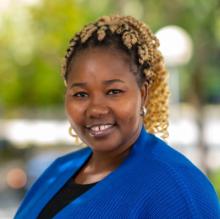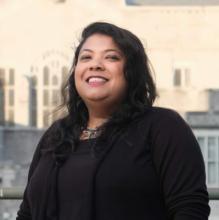Tattersall, Erin
Being a UBC Public Scholar is an opportunity to redefine how we create knowledge, what we can do with it and who benefits. By working with communities and diverse collaborators across sectors, I get the chance to strengthen the connection between the generation of ideas and seeing those ideas come to life out in the world.
Research Description
The current biodiversity crisis coincides with greater recognition of Indigenous sovereignty worldwide and efforts to address the complex legacy of Western science involving Indigenous Peoples. Across the scientific community, there is a need to transform the relationship between ecologists and Indigenous Peoples by engaging in meaningful partnerships and actively supporting Indigenous governance of Indigenous territories and resources. Increasingly, wildlife scientists are rethinking approaches to wildlife monitoring in a way that builds trust, creates shared learning opportunities and makes wildlife science meaningful to all partners. My research explores how wildlife monitoring can achieve both Western scientific and Indigenous sovereignty priorities, using a collaborative initiative in the Northwest Territories (the Northwest Territories Biodiversity Monitoring Program, or NWTBMP) as a case study. Specifically, I address this through two main foci: Indigenous Data Sovereignty (IDS, or the authority of Indigenous Peoples to govern data according to their own laws and protocols) in collaborative monitoring, and applications of wildlife data that support Indigenous stewardship priorities, namely the conservation of wildlife valued as cultural keystone species or as food sources. I am working with multiple Indigenous partners of the NWTBMP to ensure that my research questions and use of data are appropriate and directly applicable to land and wildlife stewardship within their territories. This work will contribute to shifting the landscape of collaborative conservation in the North towards stronger partnerships between Indigenous Peoples and Western scientists, as well as model innovative approaches to wildlife monitoring globally.
What does being a Public Scholar mean to you?
To me, being a UBC Public Scholar is an opportunity to redefine how we create knowledge, what we can do with it and who benefits. By working with communities and diverse collaborators across sectors, I get the chance to strengthen the connection between the generation of ideas and seeing those ideas come to life out in the world.
In what ways do you think the PhD experience can be re-imagined with the Public Scholars Initiative?
The PSI connects innovative thinkers from across academic fields, creating an expansive network that nurtures idea cross-pollination and creativity. It brings together PhD students with a diversity of experiences and expertise, which challenges the notion of a PhD being highly specialized and individual and redefines it as an interdisciplinary and collaborative endeavour. Initiatives like the PSI help students break down academic silos and link their research more directly to real-world applications.
How do you envision connecting your PhD work with broader career possibilities?
My PhD work is highly collaborative and bridges the social and ecological components of wildlife stewardship. My experiences are teaching me how to work well in large teams, hold space for multiple perspectives and seek creative solutions to ensure Indigenous sovereignty is affirmed throughout collaborative research. I envision that this work sets me up for a career navigating complex aspects of applied ecology and bringing together people with diverse worldviews and interests to realize common goals of protecting wildlife and land.
How does your research engage with the larger community and social partners?
My research connects me with Indigenous communities and local governments across the Northwest Territories. In addition to working closely with federal and territorial government partners, I meet with Indigenous partners (in community, when possible) to discuss my research plans, ensure that the work aligns with local stewardship priorities and that data is stewarded appropriately and respectfully. I also work with all partners to share resources and information on Indigenous Data Sovereignty and wildlife data stewardship, connecting partners with innovative research to inform the development of their own data governance strategies for collaborative wildlife conservation.
Why did you decide to pursue a graduate degree?
I decided to pursue a graduate degree because learning in research settings brings me immense joy. I love discovering and making connections between new ideas, not only across academic disciplines but across my life experiences and personal relationships as well. My graduate degrees have given me the freedom to pursue diverse research interests and explore creative approaches to navigating an increasingly complex world.
Why did you choose to come to British Columbia and study at UBC?
I chose to study at UBC for the opportunity to work with academics at the forefront of innovative and interdisciplinary research focused on wildlife and land stewardship. UBC is actively working towards embracing diverse ways of knowing and learning in academic research, and developing research collaborations that connect academia directly to real-world applications of new knowledge. My choice to study here was motivated by the chance to be involved in this exciting network of innovative thinkers.



